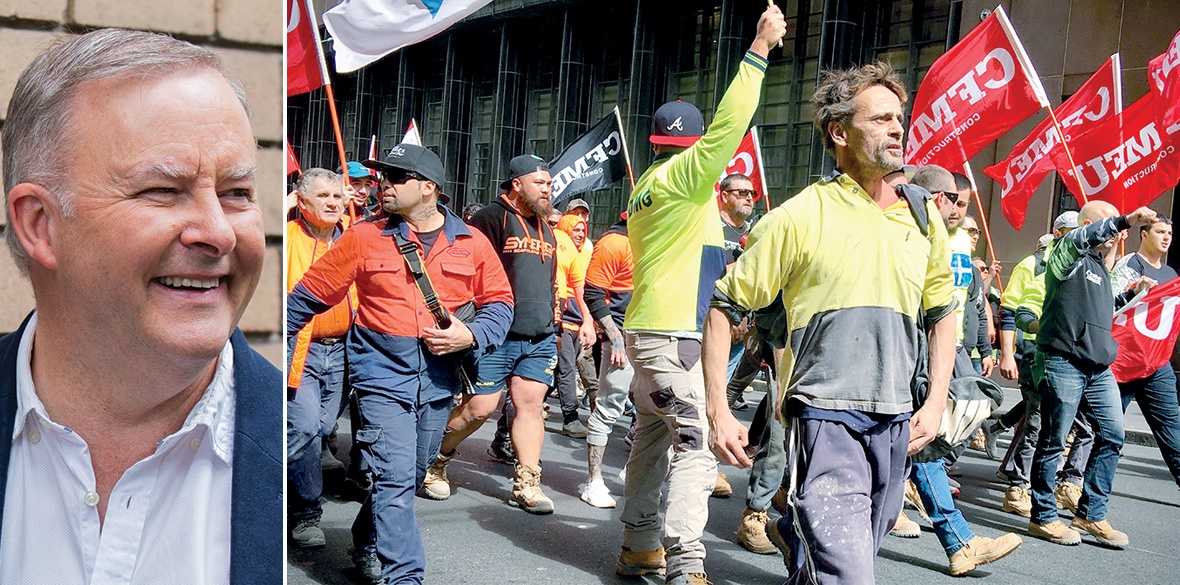This is the last article you can read this month
You can read more article this month
You can read more articles this month
Sorry your limit is up for this month
Reset on:
Please help support the Morning Star by subscribing here
THE news last week that British employers body the CBI had been attempting to persuade the Labour Party to water down pro-worker proposals in Labour’s New Deal For Workers came as no surprise. Past history shows that employers and the Tories always attempt to push back on changes to employment rights which are long overdue and popular with working people.
Perhaps the recent experiences of our comrades in the Australian trade union movement and the Labor Party (ALP) in pushing through pro-worker legislation are worth examining.
The government of Labor Prime Minister Anthony Albanese has secured legislation that provides for a quarter of a million Australian workers to have access to minimum standards at work for the first time.
The Fair Work Legislation Amendment (Closing Loopholes) Bill 2023 has introduced new powers for the Australian Fair Work Commission to set minimum standards for gig economy workers, including those involved in ride-sharing and fast food delivery.
Aussie gig workers will now be considered “employee-like” if they meet certain criteria including that the worker is engaged under a services contract, performs digital platform work and has low bargaining power in relation to that contract and low control over their work.
As expected employers reacted with fury. Business Council of Australia chief executive Bran Black described the changes as “anti-business.” He said the new protections were “anti-worker and they come at a time that Australia can least afford it.”
However, Australia’s Workplace Relations Minister Tony Burke (no relation) said: “If there’s a tiny bit extra you pay when your pizza arrives and they’re more likely to be safe on the roads, then I reckon it’s a pretty small price to pay.”
Given opposition by the right-wing Liberal Party and employers, the Albanese government required the support of the Greens and at least two independent senators to pass the legislation.
After months of negotiating they sealed the deal with independent (and ex-rugby union professional) senator David Pocock, who said his constituents were supportive of the change and recognised small cost increases were necessary to protect workers.
Besides protecting gig workers, other changes include a pathway for casual workers wanting to convert to more permanent work and a new definition of employment and better protections for road transport workers including independent contractors.
It also introduces a “right to disconnect,” preventing employees from being disadvantaged for not answering calls or emails outside of working hours.
Australian Manufacturing Workers Union (AMWU) national president Andrew Dettmer explained: “The right to disconnect is enshrined in law in a number of countries including France, and many workers such as police have negotiated these rights in their collective agreements.
“Of course, the right-wing Liberals are claiming that exercising such a right would cause the breakdown of industry. But effectively this will stop employers from demanding that people do out-of-hours work for free. Of course, it won’t stop paid work out of hours.
“Predictably, Australian opposition leader Peter Dutton has joined the chorus of outraged employers and promised to repeal the law if returned to power. Unfortunately for him, polling is showing that the new law is overwhelmingly supported, especially from those workers whose family time — and sleep — is interrupted by employers demanding a response.
“This promise will probably go the way of his pledge to repeal the latest tax cuts — which lasted less than a week,” Dettmer said.
Australian Congress of Trade Unions (ACTU) secretary Sally McManus said the changes were a great win for workers. “Not only will casual and gig workers have more rights, protections, and choices, but all workers can look forward to a better working life.”
Tony Burke is co-chair of the Campaign For Trade Union Freedom.







